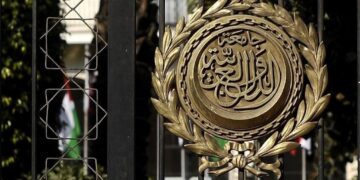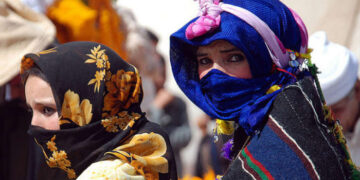Over the past decade, the Gulf Arab states have witnessed significant transformations in the political role of women, with women now occupying leadership positions and participating in decision-making at various levels. Despite the substantial challenges they face—whether societal, economic, or political—Gulf governments have managed to enhance women’s participation in political life through the enactment of legislation and the launch of supportive initiatives and programs. However, achieving full empowerment for women continues to face several obstacles.
Challenges Facing Women’s Empowerment in the Gulf States
To understand the progress made in women’s empowerment in the Gulf states, it is first necessary to shed light on the challenges in the Gulf region and the broader Arab world. Women’s participation in the Middle East, in general, remains lagging. For example, in 2018, women’s participation in the global workforce was 39%, while in the Middle East, it was only 20.3%.
A set of interconnected and cumulative factors collectively represent challenges to women’s roles, including factors related to the religious environment, political system, public awareness, education, and the concept of citizenship. The challenges facing women’s political empowerment in the Gulf states can be categorized into three groups:
- Societal Challenges
Customs and traditions remain one of the main barriers to women’s political empowerment in some Gulf states. The traditional view of women’s roles in society restricts their participation in public affairs and makes it difficult for them to run for elected positions or assume leadership roles.
Despite positive changes in recent decades, some Gulf societies still view political work as a field reserved for men. In some cases, women face additional challenges when attempting to engage in political life, such as social pressures or resistance to the idea of women leading political institutions. Nevertheless, this perception has begun to change thanks to awareness efforts and government initiatives aimed at enhancing women’s roles in society.
- Economic Challenges
The economic aspect is one of the most prominent factors hindering Gulf women from entering the political arena with strength. Competing in political contests requires financial resources and support from various entities, whether from political parties, business leaders, or voters themselves. Despite efforts to promote women’s participation in the labor market and provide a supportive economic environment, achieving full financial independence remains a barrier to their effective political engagement.
Additionally, the gender wage gap in certain sectors may affect women’s ability to fund their election campaigns, limiting their options compared to male candidates who may have access to greater resources.
- Political and Legislative Challenges
Despite the significant progress made by Gulf states in involving women politically, some laws and procedures still need further updates to ensure greater representation for women. For example, in some countries, women’s participation in elections and legislative bodies remains limited compared to men, and the nature of the political system may affect women’s opportunities to access decision-making positions.
In some cases, women’s participation in governments and advisory councils is limited to a few appointments, making their role unequal to men in shaping policies and making major decisions. However, ongoing efforts are being made to reform these systems and enhance women’s presence in government institutions.
Moreover, there are still restrictions at the level of Arab countries as a whole, such as the weakness of civil society institutions, the low presence of women in political party programs, limited financial resources, and other constraints. These include limited appointments to leadership and political positions, limited political education and development programs for women, family responsibilities (where family duties and childcare are seen as obstacles to political engagement), difficulties in obtaining funding (women face challenges in securing financial support for political election campaigns), and psychological and social pressures (women working in politics face psychological and social pressures due to high societal expectations and fear of criticism).
Gulf Legislation and Measures for Women’s Empowerment
Given the focus on women’s roles and the development of their political participation in Gulf states, these countries have taken several measures and enacted legislation that have positively contributed to empowering women and facilitating their political involvement. These measures included appointments of women to leadership positions in politics, diplomacy, and economics across all Gulf states, allocating quotas for women in some Gulf countries, and establishing support programs and visions dedicated to women’s empowerment.
Gulf states have taken tangible steps in recent years to improve women’s access to education, healthcare, and employment, as well as to encourage their participation in political life. For example, in Saudi Arabia, restrictions on freedom of movement and obtaining passports without a guardian’s permission were lifted, workplace discrimination was banned, and laws were enacted to protect women from oppression or sexual harassment in the workplace.
Women’s Empowerment in Qatar: Achievements and Challenges
In recent years, the State of Qatar has made notable progress in empowering women and enhancing their role in various fields, whether at the national, regional, or international level. This development aligns with Qatar National Vision 2030, which prioritizes women’s empowerment, stemming from its belief in the importance of enhancing women’s rights and ensuring their effective participation in sustainable development.
Qatar is committed to achieving equal opportunities between genders in education, employment, and care, making it a regional leader in gender equality indicators. Qatar is among the countries with the highest rates of women’s participation in the labor market, and it achieves wage equality in the public sector.
In education, Qatari women have made significant progress, with females accounting for 70% of graduates in fields such as information systems, computer engineering, engineering, medicine, pharmacy, and sciences, reflecting the increasing presence of women in scientific and technological fields.
Qatar has seen developments in women’s participation in the economic sector, with women making up 58.3% of the workforce, surpassing the global average. Qatari women have also made a notable presence in entrepreneurship, with 15% of women owning private businesses, with investments estimated at around USD 25 billion.
Qatari women have become active partners in decision-making, holding leadership positions in various sectors, including education, medicine, engineering, diplomacy, security, and aviation. Qatar was the first Gulf Cooperation Council (GCC) country to grant women the opportunity to work as judges, with women constituting more than 48% of the workforce in the Supreme Judiciary Council, and 69% of women holding senior positions in judicial administration. Additionally, Qatar has contributed to enhancing women’s presence in the judiciary internationally, as it proposed the resolution adopted by the United Nations General Assembly to designate March 10 as the International Day of the Female Judge. Qatar also pays special attention to empowering women with disabilities, providing them with support and skill-building programs to ensure fair opportunities in the labor market and professional development.
Women’s Empowerment in the Gulf Arab States
The steps taken to empower women in the Gulf have been based on national strategies aimed at enhancing women’s roles. Among these steps are those related to women in Saudi Arabia’s Vision 2030, launched by Crown Prince Mohammed bin Salman, which allowed women to participate in municipal elections. In Qatar, measures have been taken in recent years to appoint women to important leadership positions. Bahrain was the first Gulf state to ensure women’s political participation in legislative councils and allocated quotas for women, with Ms. Fawzia Zainal reaching the position of Speaker of the Legislative Council. In Oman, the state enacted laws to ensure women’s representation in parliaments and legislative councils.
In the UAE, the government, through measures encouraging women’s participation, achieved 50% representation in government positions. In Kuwait, encouraging women and taking measures to ensure their political participation began early, with several women holding ministerial positions. Kuwait was among the first Gulf states to grant women the right to vote and run for office through legislation.
In general, Gulf states’ measures to empower women have included launching educational programs to empower women in political life, offering training programs in political and administrative fields, reviewing and amending laws to ensure gender equality, and introducing initiatives to ensure women’s representation in legislative and executive positions in the state.
Development of Women’s Political Role in the Gulf
Based on these measures and steps reflecting awareness of women’s roles in Gulf states, recent years have seen significant developments in women’s empowerment. Women in Gulf states now account for 30 to 40% of the total workforce. Some of the positions assigned to women can be highlighted: In Qatar, three women hold ministerial portfolios as of 2025, with the Qatari government, following the latest cabinet reshuffle in November 2024, including three women: H.E. Buthaina bint Ali Al-Jabr Al-Nuaimi, Minister of Social Development and Family; H.E. Lolwah bint Rashid bin Mohammed Al-Khater, Minister of Education and Higher Education; and H.E. Mariam bint Ali bin Nasser Al-Misnad, Minister of State for International Cooperation at the Ministry of Foreign Affairs. This ministerial formation demonstrates Qatar’s commitment to enhancing women’s roles in government leadership positions. In Oman, the first woman reached a ministerial position in 2003, with Ms. Aisha bint Khalfan appointed as Chairperson of the Public Authority for Craft Industries. Bahrain witnessed a significant event in this field when Ms. Fawzia Zainal was elected Speaker of Parliament. In the UAE, women’s representation in the government reached 50%. In Saudi Arabia, there was a significant leap in women’s empowerment, with representation nearing half in the Shura Council, and women were appointed to important diplomatic and executive positions.
Gulf states have also appointed several women to ministerial and deputy ministerial positions, as well as ambassadors, with women in these roles actively and effectively participating and contributing to shaping political, administrative, and diplomatic decisions. For example, H.E. Amna bint Abdullah Al-Dahak holds the position of Minister of Environment in the UAE, among other female ministers in the Emirati government, a position of importance to the state and influential in its international relations.
H.E. Reema bint Bandar Al-Saud serves as Saudi Arabia’s ambassador to Washington, a highly significant diplomatic post. In Oman, H.E. Madiha bint Ahmed serves as Minister of Education, and H.E. Ambassador Maitha bint Saif Al-Mahrouqiya serves as Oman’s ambassador to Germany. In Bahrain, H.E. Jaleela Jawad serves as Minister of Health, among five other female ministers in the Bahraini government. In Kuwait, H.E. Nora Al-Mashaan serves as Minister of Public Works, among other female ministers in the Kuwaiti government, and H.E. Ambassador Reem Al-Khaled serves as Kuwait’s ambassador to Germany.
In general, government positions at various levels are seeing an increasing number of women, including sensitive and important roles that effectively contribute to shaping state decisions and actions. Women’s participation rates are steadily rising, a genuine indicator that women’s political empowerment in Gulf states has evolved, and the political role of women in the Gulf is developing. However, it is necessary to note that more support and measures are still required to encourage greater women’s political participation and protect them from any negative societal or familial impacts resulting from such participation.







